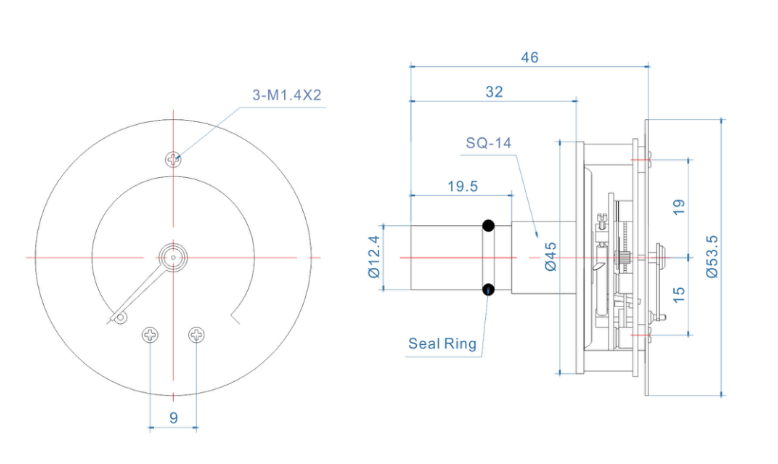
Aug . 13, 2024 09:40 Back to list
Leading Manufacturers of Differential Pressure Gauges for Various Industrial Applications and Solutions.
Understanding Differential Pressure Gauges and Their Manufacturers
Differential pressure gauges are essential instruments widely used in various industries to measure the pressure difference between two points within a system. These devices play a critical role in monitoring processes in diverse fields such as oil and gas, pharmaceuticals, water treatment, and HVAC systems. The manufacturers of differential pressure gauges are crucial players in ensuring that these instruments are reliable, accurate, and tailored to meet specific application needs.
What is a Differential Pressure Gauge?
A differential pressure gauge compares the pressure exerted at two different points in a system. This measurement can provide insights into fluid flow, filter conditions, or the functionality of various mechanical systems. The basic principle involves measuring the pressure at two points and displaying the difference, allowing operators to monitor the performance of equipment effectively.
The design of these gauges can vary, using technologies such as diaphragm, piston, or capacitive sensing methods. Each type has its advantages and is chosen based on the specific requirements of an application, such as the nature of the fluid being measured, pressure range, accuracy, and environmental conditions.
The Role of Manufacturers
Manufacturers of differential pressure gauges play a pivotal role in ensuring the availability of high-quality products that meet industry standards. They invest in advanced technology and research to design gauges that are not only accurate but also durable and easy to install and maintain. Leading manufacturers often provide a wide range of products, including analog and digital gauges, to accommodate the diverse needs of their customers.
Reputable manufacturers ensure that their products comply with international standards such as ISO, ANSI, and ASME, which are essential for quality assurance and reliability. They may also engage in rigorous testing processes, utilizing calibration standards to guarantee that each gauge meets the specific technical specifications before it reaches the market.
differential pressure gauges manufacturers manufacturer

Key Manufacturers and Innovations
Several manufacturers have established themselves as leaders in the differential pressure gauge market. Companies like Ashcroft, WIKA, and Omega Engineering are known for their innovative designs and robust product lines that cater to various industrial applications. These manufacturers often incorporate modern technologies to enhance the functionality of their gauges, including features such as wireless communication capabilities, data logging, and remote monitoring.
Innovation does not stop at functionality; manufacturers are also focusing on the ease of use and integration of their products into existing systems. Many current models boast user-friendly interfaces and software that allow for seamless calibration and data analysis, streamlining how operators interact with these crucial instruments.
Considerations for Choosing a Manufacturer
When selecting a differential pressure gauge manufacturer, customers should consider several factors. Firstly, the reputation of the manufacturer is vital; established companies with proven track records are often preferred due to their reliability in product quality and customer service. Additionally, the availability of technical support and resources for installation and maintenance can be invaluable.
Customers should also evaluate the range of products offered. A manufacturer that provides a diverse selection of gauges and accessories can better meet varying application requirements. Furthermore, looking for manufacturers that offer customization options can be advantageous, ensuring that specific industry needs are precisely met.
Conclusion
In conclusion, differential pressure gauges are indispensable tools within numerous industrial processes, and their manufacturers play a crucial role in the engineering and availability of these instruments. By focusing on quality, innovation, and customer service, these manufacturers help ensure the safe and efficient operation of various systems. As technology continues to evolve, we can expect further advancements in differential pressure measurement, driven by the dedication of industry-leading manufacturers.
-
High-Precision 5 Valve Manifold Differential Pressure Gauge Suppliers
NewsApr.29,2025
-
High-Precision Diaphragm Vacuum Pressure Gauges Manufacturers & Quotes
NewsApr.29,2025
-
Omega Differential Pressure Gauges High Accuracy & Durability
NewsApr.28,2025
-
Low Pressure Differential Pressure Gauges Precision Solutions & Quotes
NewsApr.28,2025
-
Digital Diaphragm Pressure Gaauge Precision Measurement & OEM Quotes
NewsApr.28,2025
-
Differential Pressure Gauge China Price High-Accuracy & Best Quotes
NewsApr.28,2025
